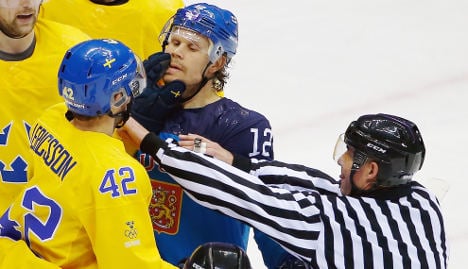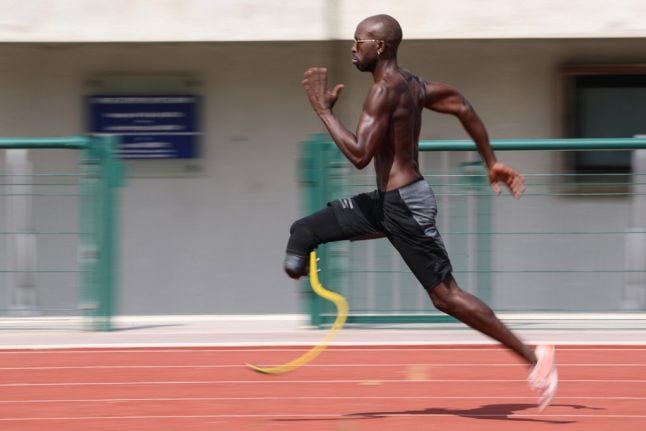OLYMPICS
Sweden’s men reach ice hockey final in Sochi
The Swedes enjoyed a come-from-behind victory against the Finns in Friday's ice hockey semi-final at the Winter Olympics in Sochi.
Published: 21 February 2014 15:32 CET

The lineman pulls Sweden forward Jimmie Ericsson and Finland forward Olli Jokinen apart during the first period. Photo: TT
The men's team remained undefeated on Friday afternoon following a 2-1 thriller against Finland.
Erik Karlsson scored a powerplay goal late in the second period as Sweden rallied from a 1-0 deficit to reach their first final since they won gold at Turin in 2006. The other goal was scored by Loui Eriksson, who netted two against Slovenia in the quarter final win.
IN PICTURES: See some of the best snaps from team Sweden
Karlsson, with his tournament-leading eighth point, scored with 3:34 left in the second on a shot from the point. Finnish goaltender Kari Lehtonen got a piece of Karlsson's shot but not enough.
Finland has been beset by injuries and the news got worse prior to the game against Sweden when their top goaltender Tuukka Rask was taken off the roster for Friday's game.
Rask was replaced by Lehtonen, who finished with 23 saves. Finland was already missing their four top centres, including Saku Koivu and Aleksander Barkov.
Olli Jokinen opened the scoring for Finland 6:17 into the second period on a sharp angle shot that somehow squeezed through goalie Henrik Lundqvist's leg pads and trickled over the goal line.
Defenceman Sami Vatanen, who played a strong game for Finland, started the play by shooting the puck into the corner where Jokinen picked it up.
Loui Eriksson's goal tied it up for Sweden, 1-1, five minutes later after being left alone at the side of the net.
Finnish defenceman Olli Maatta turned the puck over behind the net and Nicklas Backstrom got it out front to Jonathan Eriksson who quickly moved it to Eriksson who had an open net to shoot at.
Sweden finished the round robin with the best record and won its first four matches in this tournament: 4-2 against Czech Republic, 1-0 against Switzerland, 5-3 against Latvia and 5-0 against Slovenia.
Friday's semi-final marked the final Winter Games contest for all-time Olympic scoring leader Teemu Selanne, of Finland, who finished with 41 career points after adding four more from the Sochi Games.
The Swedes will meet either defending champions Canada or the United States in Sunday's final.
Sweden, who have won all five of their games in Sochi, have finished fifth or won the gold medal in their last half dozen Winter Olympics.
The final will be played on Sunday at 1pm, Swedish time.
Url copied to clipboard!




 Please whitelist us to continue reading.
Please whitelist us to continue reading.
Member comments